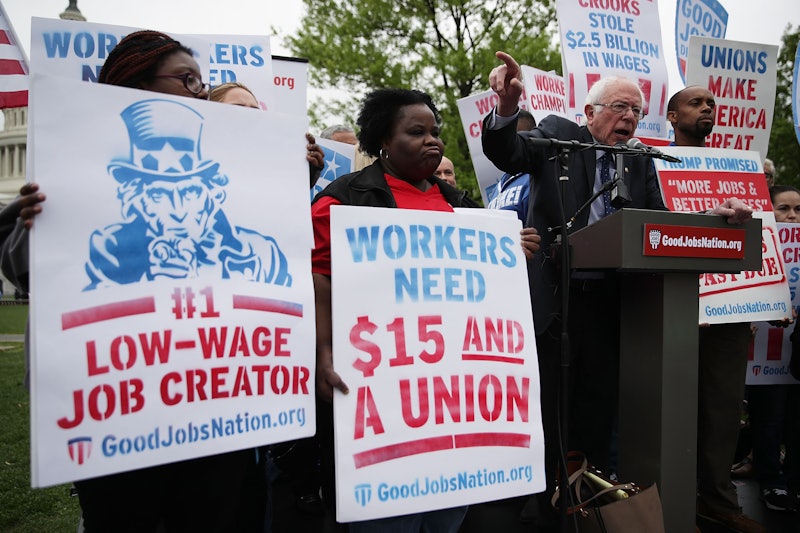News
Over 4 Million Americans’ Hourly Wages Are Getting Bumped Up For 2018

Millions of American workers will be getting some great news on New Year's Day, as 18 states are scheduled to raise their minimum wage as soon as the clock strikes midnight. According to the economic policy institute, this will result in an immediate raise for 4.5 million workers across those 18 states.
Raising the minimum wage has long been a priority for progressives: The federal minimum wage does not increase automatically with inflation, and has been stuck at $7.25 an hour since 2009. In response, states and local jurisdictions often pass their own minimum wage increases, and a slew of those increases are set to go into effect on January 1st, 2018.
Here's what the new minimum wage will be in each of those states, according to the Huffington Post.
- Alaska: $9.84, $.04 increase
- Arizona: $10.50, $.50 increase
- California: $11.00, $.50 increase
- Colorado: $10.20, $.90 increase
- Florida: $8.25, $.15 increase
- Hawaii: $10.10, $.85 increase
- Maine: $10.00, $1.00 increase
- Michigan: $9.25, $.35 increase
- Minnesota: $9.65, $.15 increase
- Missouri: $7.85, $.15 increase
- Montana: $8.30, $.15 increase
- New Jersey: $8.60, $.16 increase
- New York: $10.40, $.70 increase
- Ohio: $8.30, $.15 increase
- Rhode Island: $10.10, $.50 increase
- South Dakota: $8.85, $.20 increase
- Vermont: $10.50, $.50 increase
- Washington: $11.50, $.50 increase
The actual effect of these increases will differ wildly from state to state. The lowest-paid workers in Washington state will be paid $11.50 an hour in 2018, thanks to a $.50 increase in the state minimum wage. In Missouri, however, the meager $.15 increase will kick the minimum wage up to a mere $7.85 an hour, which is just $.60 more than the federal minimum. In Alaska, meanwhile, the amount of the increase is quite small — just $.4 per hour — for an after-increase minimum wage of $9.84.
It's also worth noting that not all of these increases came about in the same way. In eight states — Alaska, Florida, Minnesota, Missouri, Montana, New Jersey, Ohio, and South Dakota — wages are going up automatically due to state laws that peg the minimum wage to inflation. In the other 10 states, wages will go up thanks to ballot measures or legislation that, as opposed to pegging the minimum wage to inflation, simply mandated that the minimum wage go up by a certain amount in 2018.
Although federal legislators have regularly passed laws to manually increase the minimum wage, the actual purchasing power of the minimum wage has decreased drastically since the 1960s. For instance, the minimum wage was only $2.65 per hour in 1978; when adjusted for inflation, however, that comes out to $10.64 an hour in 2017 dollars. And yet the actual federal minimum wage in 2017 was still just $7.25.
In other words, even though the actual dollar amount of the federal minimum wage has gradually gone up over the decades, inflation has decreased the value of the U.S. dollar at a faster rate, thus canceling out the effect of those minimum wage increases. As a result, the lowest-paid workers in the U.S. have effectively seen their wages decrease since the 1960s by around 25 percent, according to the left-leaning Economic Policy Institute.
According to a June poll, the majority of Republicans and Democrats support increasing the minimum wage, and it's gradually become a mainstream policy position for Democrats.
When Sen. Bernie Sanders introduced a bill in 2015 to increased the federal minimum wage to $15 an hour, only five of his Democratic colleagues supported it. Sanders went on to campaign for a $15 minimum wage during his presidential run, and this was accompanied by a $19 million campaign by organized labor to accomplish the same.
The next year, the Democratic Party incorporated a $15 minimum wage into its official policy plank for the first time. Sanders then reintroduced his 2015 bill in 2017 — and no fewer than 30 Senate Democrats co-sponsored it.